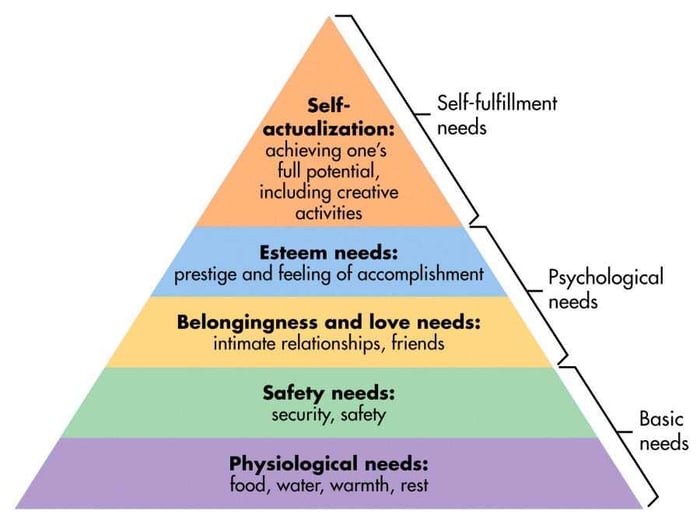 Authored by Brooke M Feldman, MSW
Authored by Brooke M Feldman, MSW
While teaching a class on eminent psychologist Abraham Maslow’s human hierarchy of needs theory to aspiring behavioral health professionals, a student raised her hand to ask me the following question:
“Is this where the idea of people struggling with addiction having to hit “rock bottom” comes from?”
This insightful student was looking up on the screen at Maslow’s hierarchy of needs pyramid and referring to the all-too-common thinking surrounding people living with addiction. Nearly all of us have heard the notion somewhere along the way that people living with addiction must hit a proverbial “rock bottom” before being “willing” to change their addictive behavior. Nearly none of us have escaped being socially indoctrinated into the idea that in order to best support somebody living with addiction, we must move out of the way to allow for their inevitable fall to “rock bottom.” We have been told that to do otherwise would mean “enabling” the person to continue on with their addiction. Sadly, this thinking has been a poisonous source of tremendous unnecessary harms, the most tragic of which continues to be countless preventable deaths.
As the inquisitive student and remainder of the class looked up at the largely projected pyramid of Maslow’s hierarchy of needs, all present could visually see that at the bottom of the pyramid lie basic physiological needs being met such as food, shelter, rest, etc. Closely following the bottom of the pyramid on the second level is basic psychological needs being met such as feeling safe, secure, etc. To that end, the student’s question and what she was getting at could be rephrased as:
“Is Maslow’s theory where the idea comes from that people struggling with addiction have to go without food, shelter, rest, safety, security, etc. in order to want to get better?”
I had just taught the class how the task of reaching the highest level of human need that Maslow called self-actualization, or achieving one’s full potential, was contingent on the majority of other needs in the pyramid being met. We had just reviewed how each level of the pyramid builds off of the last and had just discussed how it is nearly impossible to move up the pyramid if the needs below are not being met. We had just spent some time talking about how Maslow’s theory would be relevant in their work as behavioral health professionals, how this theory could serve as a critical key for how to best meet people where they are at.
And so, here we were, with the question at hand essentially being did the idea of people living with addiction have to go without having their basic needs met in order to reach living up to their potential come from Maslow’s theory?
I asked the class to look at the pyramid and tell me what they thought the answer was, and furthermore, what they thought would bring people struggling with addiction closer to reaching their full potential.

And right there up on the screen, the answer sat plain as day.
According to Maslow, “rock bottom” is the furthest place one can be when it comes to having their necessary needs met to reach their full potential.
Instead, if we are looking for what brings somebody closer to achieving self-actualization, closer to wellness, closer to reaching their full potential, we see that it is thru having the psychological needs of belonging, love and esteem being met that people move closer to that place.
Maslow tells us that in addition to having our basic needs met, it is a sense of security, safety, connectedness, community, acceptance, intimate relationships, being able to give and receive love, etc. which bring people closer to reaching their full potential.
Maslow has in fact long told us that having the needs met of self-worth, a sense of purpose, achieving goals, feeling good about oneself, having a sense of accomplishment, etc. are what brings people closer to self-actualization than “rock bottom” ever could.
And so, back to the student’s initial question.
“Is this (Maslow’s theory) where the idea of people struggling with addiction having to hit “rock bottom” comes from?”
The answer to that question is that it would only be if somebody did not understand Maslow’s theory on the hierarchy of human needs that they could ever believe in the idea of people having to “hit rock bottom” in order to get better.
Moreover and perhaps more importantly than the answer to that question, the larger lesson this inquiry brought was a deeper understanding of what Maslow tried to tell us way back in 1943.
The key to supporting people living with addiction in reaching their full potential is the exact opposite of “letting them hit rock bottom.”
The key is instead to move the bottom of that pyramid of human needs up so that the needs which are known to bring people closer to reaching their full potential are being met.
It means to foster social connectedness rather than to force isolation.
It means to practice acceptance rather than intolerance.
It means to fan self-worth rather than to fuel shame.
It means to love rather than to disdain.
Ultimately, there is really no good psychology behind the idea of forcing people into “hitting rock bottom.”
There is however plenty of good psychology behind what brings people closer to wellness and full potential. It is long past time that the ways in which we view and treat addiction line up less with opinion, personal moral belief and socially transmitted misinformation and instead more with what science tells us about human behavior and social development. Interestingly, it seems that it is in the science where we find the compassion, empathy, and understanding that society is still too often lacking.
This article was originally published on medium.com and has been republished with permission from the author.
Don’t Wait for Rock Bottom – SMART Recovery Can Help
If you want to address any addiction or harmful habit, SMART Recovery can help. Click here to learn more about how SMART Recovery helps individuals with addiction. And, if you’re ready to get started, search for a meeting near you and/or join our online community where we have daily online meetings and 24×7 message boards and chat rooms.
If you’re a family member or friend of someone with addiction, SMART Recovery can help you, too. SMART Recovery Family & Friends is a science-based, respectful, and empowering alternative to the harsh approach to “letting them hit bottom”. Our methods are based on the tools of SMART Recovery and CRAFT (Community Reinforcement And Family Training) and are congruent with the thoughts shared in this article.

